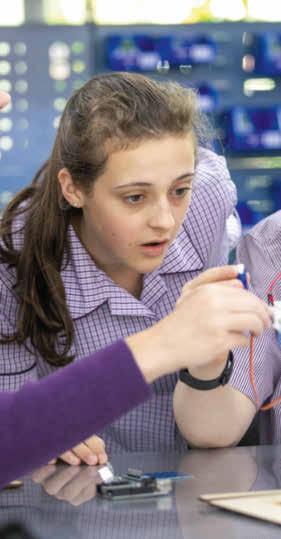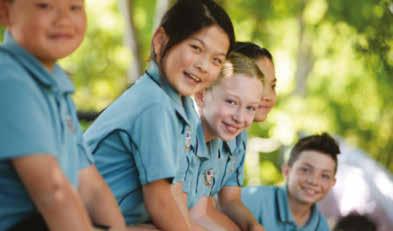
5 minute read
Cornish College
Principal Nicola Forrest
Nicola joined Cornish in 2013 and was appointed Principal in August 2019. She presents workshops and keynote addresses for educators throughout Australia in curriculum design, pedagogical leadership and innovation in middle years education. 65 Riverend Road, Bangholme VIC 3175
When you choose Cornish College, you choose a wealth of educational experiences. From our passionate, experienced staff to the many co-curricular opportunities, Cornish offers an education quite like no other.
Located on 100 acres of natural parkland, Cornish provides Early Learning to Year 12 students the space to stretch their legs and their curiosity, exploring knowledge beyond the classroom walls and in nature’s classroom. Our environment is the key to our vision of educating students for a sustainable, thriving future. We are committed to this vision, engaging our students beyond textbooks and encouraging a different way of thinking, one which considers how our decisions impact the world around us.
Our motto is “Make a Difference”. At the heart of this is our dedication to developing independence, compassion and personal excellence amongst our students, ensuring they have the capacity and the desire to make a difference, both locally and globally.
“At Cornish, we are developing a curriculum to educate for a sustainable future now, with structures that mobilise the attitudes, skills, knowledge and values required for young people to become the best individuals they have the capacity to be,” Principal Nicola Forrest said.
THE BASICS
Enquiries
+61 3 9781 9000 cornishcollege.vic.edu.au admissions@cornishcollege. vic.edu.au
Years
Early Learning – Year 12
Denomination
Associated with the Uniting Church
Gender
Co-educational
Fees
$11,788 – $20,724
Boarding \ No
Scholarships \ Yes
WHY CORNISH?
Our inspiring learning environment and holistic approach to education empowers students to be curious, courageous and compassionate. Our expert teachers design meaningful curriculum that challenges and extends future leaders.
COMMUNITY
We are a supportive and cohesive community that values and prioritises the wellbeing of each person. Cornish has a strong and welcoming relationship with all those integral to our development – parents, alumni and friends.
* Results are provided by the school, Domain does not warrant their accuracy
FORWARD-THINKING
Cornish offers education of a different kind. We give students the tools to thrive now and into the future to meet the socio-cultural, economic, technological and environmental challenges of our time.
OUR SUCCESS
Cornish excels in academia, sport, the arts, and social and environmental leadership. We have awardwinning learning spaces and teachers who are thought leaders. Success is evident in the way our students make a difference.
TECHNOLOGY AND THE CLASSROOM
STEM subjects provide opportunities for critical thinking and problem solving.
BY PETER HANLON
NAVIGATING THE REAL WORLD
Micah Wilkins doesn’t remember the acronym STEM being used in his school days, which ended in the early 2000s, around the time it was popularised. Now, as head of digital learning and innovation at Camberwell Girls Grammar School, the catch-all for science, technology, engineering, and mathematics is part of his everyday world.
Yet for all of the advances made in how science and technology is taught in the classroom, the principle behind STEM learning remains the same as when Wilkins took on an elective called electronics in year 9 and used a soldering iron, among other tools, to construct a small recording device. (He laughs, recalling that his never actually worked, while another classmate’s exploded.)
“The thinking then is not dissimilar to what we’re trying to get our students to do now,” he says. “We’re working with real-world problems; we’re using tools of the trade; we are asking big questions and being curious with our learning.
Dean Pearman, head of digital learning and practice at Wesley College, agrees that for all of the wonderful learning environments that school Makerspaces and STEM laboratories now offer students, to see them as purely the domain of the technologically minded is to miss a crucial part of the picture.
At Wesley, digital technology studies sit under the holistic-approach-tolearning umbrella that envelops every class and subject, from prep to year 12. It recognises the importance of technology in the life of the community and is used not simply to design and build amazing things but to embed the necessary skills in cyber safety and in digital privacy and wellbeing that will help young people thrive after walking out through the school gate for the last time.

STEM and what it means,” Pearman says. “When you start to suggest that you have to be innately good at technology to be involved in STEM spaces and labs, you’re missing a whole range of other avenues in which students can work in that very same space.
At CGGS, a fleet of robots including NAO, DASH, EV3s and SPHERO help students learn coding, which Wilkins simplifies as “the language that sits behind all the web interfaces we see, all the apps we use and many of the games we play”. Yet behind the otherworldliness of the “bots” are much broader learning opportunities.
“Through robotics we ask, ‘How are we developing those important transferable skills such as critical thinking and creativity? How are we developing teamwork and organisation?’
“Doing STEM for us is, yes, you will learn some of those techy skills that are important. But underpinning that is a way of seeing and navigating the world that is more important,” says Wilkins.
“Many schools can talk about their laser cutters and 3D printers, their NAO bots and SPHEROs, but on the ground, what does it actually look like, and what does it mean for learning?
At Wesley, the remote learning experience of 2020 underscored for Pearman that technology at its core is a building material, and that young people will find meaningful ways to use it no matter what hurdles appear in their path. The broader benefits make the STEM experience all the more compelling.
“When you have been through our Makerspace or STEM lab during your educational journey at Wesley‚ to solve problems and be exposed to a designthinking process will set our students up for when they go into the workforce,” Pearman says.
important.’
MICAH WILKINS








